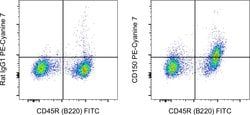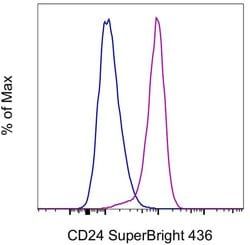7162116
CD150 Monoclonal Antibody (9D1), PE-Cyanine7, eBioscience™, Invitrogen™
Rat Monoclonal Antibody
Manufacturer: Fischer Scientific
The price for this product is unavailable. Please request a quote
Antigen
CD150
Concentration
0.2 mg/mL
Classification
Monoclonal
Form
Liquid
Regulatory Status
RUO
Formulation
PBS with 0.09% sodium azide, pH 7.2
Gene Alias
4933415F16, AA177906, CD150, CD150 antigen, CDw150, ESTM51, IPO-3, RGD1560634, signaling lymphocyte activation molecule, signaling lymphocytic activation molecule, signaling lymphocytic activation molecule family member 1, Slam, SLAM family member 1, Slamf1
Gene Symbols
Slamf1
Primary or Secondary
Primary
Content And Storage
4° C, store in dark, DO NOT FREEZE!
Gene
Slamf1
Clone
9D1
Applications
Flow Cytometry
Conjugate
PE-Cyanine7
Host Species
Rat
Target Species
Mouse
Gene Accession No.
Q9QUM4
Gene ID (Entrez)
27218
Isotype
IgG1 κ
Purification Method
Affinity chromatography
Product Type
Antibody
Description
- Description: The 9D1 monoclonal antibody reacts with mouse CD150, an ∽70 kDa transmembrane glycoprotein also known as Signaling Lymphocyte Activation Molecule (SLAM)
- CD150 is expressed by T (especially TH1) and B cells and its expression is rapidly upregulated on these cells upon activation
- Immature thymocytes and dendritic cells also express this antigen
- Signaling through SLAM in T cells induces proliferation and augmentation of the interferon-gamma response
- Furthermore, SLAM is thought to play a role in adhesion between the T cell and antigen-presenting cell
- 9D1 is reported to be an activating antibody
- Mouse hematopoietic stem cells (HSC) can be identified using SLAM family markers, such as CD150+CD244-CD48-
- For this application we recommend the use of antibody clone mShad150 (cat
- 12-1502)
- Applications Reported: This 9D1 antibody has been reported for use in flow cytometric analysis
- Applications Tested: This 9D1 antibody has been tested by flow cytometric analysis of mouse splenocytes
- This may be used at less than or equal to 1.0 μg per test
- A test is defined as the amount (μg) of antibody that will stain a cell sample in a final volume of 100 μL
- Cell number should be determined empirically but can range from 10^5 to 10^8 cells/test
- It is recommended that the antibody be carefully titrated for optimal performance in the assay of interest
- Light sensitivity: This tandem dye is sensitive to photo-induced oxidation
- CD150 (SLAM, Signaling Lymphocyte Activation Molecule) belongs to the immunoglobulin gene superfamily, and is involved in T cell stimulation
- SLAM is constitutively expressed on peripheral blood memory T cells, T cell clones, immature thymocytes, and a proportion of B cells, and is rapidly induced on naive T cells after activation
- Activated B cells express the membrane bound form, the soluble form and the cytoplasmic isoforms of SLAM
- It is suggested that signalling through homophilic SLAM-SLAM binding during B to B and B to T cell interactions enhances the expansion and differentiation of activated B cells
- Reports suggest that the extracellular domain of CD150 is the receptor for the measles virus and acts as a co-activator on T cells and B cells
- Moreover, CD150 is thought to interact with SH2D1A and with PTPN11 via its cytoplasmic domain
- Mutations CD150 gene may be associated with X-linked lympho-proliferative disease (XLP).
Compare Similar Items
Show Difference
Antigen: CD150
Concentration: 0.2 mg/mL
Classification: Monoclonal
Form: Liquid
Regulatory Status: RUO
Formulation: PBS with 0.09% sodium azide, pH 7.2
Gene Alias: 4933415F16, AA177906, CD150, CD150 antigen, CDw150, ESTM51, IPO-3, RGD1560634, signaling lymphocyte activation molecule, signaling lymphocytic activation molecule, signaling lymphocytic activation molecule family member 1, Slam, SLAM family member 1, Slamf1
Gene Symbols: Slamf1
Primary or Secondary: Primary
Content And Storage: 4° C, store in dark, DO NOT FREEZE!
Gene: Slamf1
Clone: 9D1
Applications: Flow Cytometry
Conjugate: PE-Cyanine7
Host Species: Rat
Target Species: Mouse
Gene Accession No.: Q9QUM4
Gene ID (Entrez): 27218
Isotype: IgG1 κ
Purification Method: Affinity chromatography
Product Type: Antibody
Antigen:
CD150
Concentration:
0.2 mg/mL
Classification:
Monoclonal
Form:
Liquid
Regulatory Status:
RUO
Formulation:
PBS with 0.09% sodium azide, pH 7.2
Gene Alias:
4933415F16, AA177906, CD150, CD150 antigen, CDw150, ESTM51, IPO-3, RGD1560634, signaling lymphocyte activation molecule, signaling lymphocytic activation molecule, signaling lymphocytic activation molecule family member 1, Slam, SLAM family member 1, Slamf1
Gene Symbols:
Slamf1
Primary or Secondary:
Primary
Content And Storage:
4° C, store in dark, DO NOT FREEZE!
Gene:
Slamf1
Clone:
9D1
Applications:
Flow Cytometry
Conjugate:
PE-Cyanine7
Host Species:
Rat
Target Species:
Mouse
Gene Accession No.:
Q9QUM4
Gene ID (Entrez):
27218
Isotype:
IgG1 κ
Purification Method:
Affinity chromatography
Product Type:
Antibody
Antigen: CD169 (Siglec-1)
Concentration: 0.2 mg/mL
Classification: Monoclonal
Form: Liquid
Regulatory Status: RUO
Formulation: PBS with 0.09% sodium azide, pH 7.2
Gene Alias: Cd169, dJ1009E24.1, macrophage receptor, p210, pSn, SA, SER, sheep erythrocyte receptor, sialic acid binding Ig like lectin 1, sialic acid binding Ig-like lectin 1, sialoadhesin, Sialic acid-binding Ig-like lectin 1, sialic acid-binding immunoglobulin-like lectin 1, sialoadhesin, SIGLEC1, Siglec-1, SN
Gene Symbols: SIGLEC1
Primary or Secondary: Primary
Content And Storage: 4° C, store in dark, DO NOT FREEZE!
Gene: SIGLEC1
Clone: SER-4
Applications: Flow Cytometry
Conjugate: APC-eFluor 780
Host Species: Rat
Target Species: Mouse
Gene Accession No.: Q62230
Gene ID (Entrez): 20612
Isotype: IgG2a κ
Purification Method: Affinity chromatography
Product Type: Antibody
Antigen:
CD169 (Siglec-1)
Concentration:
0.2 mg/mL
Classification:
Monoclonal
Form:
Liquid
Regulatory Status:
RUO
Formulation:
PBS with 0.09% sodium azide, pH 7.2
Gene Alias:
Cd169, dJ1009E24.1, macrophage receptor, p210, pSn, SA, SER, sheep erythrocyte receptor, sialic acid binding Ig like lectin 1, sialic acid binding Ig-like lectin 1, sialoadhesin, Sialic acid-binding Ig-like lectin 1, sialic acid-binding immunoglobulin-like lectin 1, sialoadhesin, SIGLEC1, Siglec-1, SN
Gene Symbols:
SIGLEC1
Primary or Secondary:
Primary
Content And Storage:
4° C, store in dark, DO NOT FREEZE!
Gene:
SIGLEC1
Clone:
SER-4
Applications:
Flow Cytometry
Conjugate:
APC-eFluor 780
Host Species:
Rat
Target Species:
Mouse
Gene Accession No.:
Q62230
Gene ID (Entrez):
20612
Isotype:
IgG2a κ
Purification Method:
Affinity chromatography
Product Type:
Antibody
Antigen: CD172a (SIRP alpha)
Concentration: 0.2 mg/mL
Classification: Monoclonal
Form: Liquid
Regulatory Status: RUO
Formulation: PBS with BSA and 0.09% sodium azide, pH 7.2
Gene Alias: AI835480, Bit, brain Ig-like molecule with tyrosine-based activation motifs, Brain immunoglobulin like protein with tyrosine - based activation motifs, brain immunological-like with tyrosine-based motifs, brain-immunoglobulin-like molecule with tyrosine-based activation motifs, CD172, CD172 alpha, CD172 antigen-like family member A, CD172A, Inhibitory receptor SHPS-1, macrophage fusion receptor, Macrophage membrane protein MFP150, MFR, mSIRP-alpha1, Myd1, MYD-1, myD-1 antigen, p84, Protein tyrosine phosphatase non-receptor type substrate 1 (SHP substrate 1), protein tyrosine phosphatase, non-receptor type substrate 1, Protein tyrosine phosphatase, non-receptor type substrate 1 (SHP substrate 1), Ptpns1, SHP substrate 1, SHP-1, SHPS1, SHPS-1, signal regulatory protein alpha, signal-regulatory protein alpha, signal-regulatory protein alpha-1, Signal-regulatory protein alpha-2, Signal-regulatory protein alpha-3, SIRP, Sirpa, SIRPalpha, Sirp-alpha-1, SIRPalpha2, Sirp-alpha-2, Sirp-alpha-3, swc3, swine workshop cluster 3 antigen, swine workshop cluster 3 antigen precursor, tyrosine phosphatase SHP substrate 1, tyrosine-protein phosphatase non-receptor type substrate 1
Gene Symbols: SIRPA
Primary or Secondary: Primary
Content And Storage: 4° C, store in dark, DO NOT FREEZE!
Gene: SIRPA
Clone: P84
Applications: Flow Cytometry
Conjugate: Super Bright 436
Host Species: Rat
Target Species: Mouse
Gene Accession No.: P97797
Gene ID (Entrez): 19261
Isotype: IgG1 κ
Purification Method: Affinity chromatography
Product Type: Antibody
Antigen:
CD172a (SIRP alpha)
Concentration:
0.2 mg/mL
Classification:
Monoclonal
Form:
Liquid
Regulatory Status:
RUO
Formulation:
PBS with BSA and 0.09% sodium azide, pH 7.2
Gene Alias:
AI835480, Bit, brain Ig-like molecule with tyrosine-based activation motifs, Brain immunoglobulin like protein with tyrosine - based activation motifs, brain immunological-like with tyrosine-based motifs, brain-immunoglobulin-like molecule with tyrosine-based activation motifs, CD172, CD172 alpha, CD172 antigen-like family member A, CD172A, Inhibitory receptor SHPS-1, macrophage fusion receptor, Macrophage membrane protein MFP150, MFR, mSIRP-alpha1, Myd1, MYD-1, myD-1 antigen, p84, Protein tyrosine phosphatase non-receptor type substrate 1 (SHP substrate 1), protein tyrosine phosphatase, non-receptor type substrate 1, Protein tyrosine phosphatase, non-receptor type substrate 1 (SHP substrate 1), Ptpns1, SHP substrate 1, SHP-1, SHPS1, SHPS-1, signal regulatory protein alpha, signal-regulatory protein alpha, signal-regulatory protein alpha-1, Signal-regulatory protein alpha-2, Signal-regulatory protein alpha-3, SIRP, Sirpa, SIRPalpha, Sirp-alpha-1, SIRPalpha2, Sirp-alpha-2, Sirp-alpha-3, swc3, swine workshop cluster 3 antigen, swine workshop cluster 3 antigen precursor, tyrosine phosphatase SHP substrate 1, tyrosine-protein phosphatase non-receptor type substrate 1
Gene Symbols:
SIRPA
Primary or Secondary:
Primary
Content And Storage:
4° C, store in dark, DO NOT FREEZE!
Gene:
SIRPA
Clone:
P84
Applications:
Flow Cytometry
Conjugate:
Super Bright 436
Host Species:
Rat
Target Species:
Mouse
Gene Accession No.:
P97797
Gene ID (Entrez):
19261
Isotype:
IgG1 κ
Purification Method:
Affinity chromatography
Product Type:
Antibody
Antigen: CD24
Concentration: 5 μL/Test
Classification: Monoclonal
Form: Liquid
Regulatory Status: RUO
Formulation: PBS with BSA and 0.09% sodium azide, pH 7.2
Gene Alias: CD24, CD24 antigen, CD24 antigen (small cell lung carcinoma cluster 4 antigen), CD24 molecule, CD24A, CD24a antigen, cluster of differentiation 24, FLJ22950, FLJ43543, heat stable antigen, heat-stable antigen, HSA, Ly-52, Lymphocyte antigen 52, M1/69-J11D heat stable antigen, MGC75043, Nectadrin, nectadrin heat stable antigen, R13-Ag, Signal transducer CD24, Small cell lung carcinoma cluster 4 antigen, X62 heat stable antigen
Gene Symbols: Cd24
Primary or Secondary: Primary
Content And Storage: 4° C, store in dark, DO NOT FREEZE!
Gene: Cd24
Clone: eBioSN3 (SN3 A5-2H10)
Applications: Flow Cytometry
Conjugate: Super Bright 436
Host Species: Mouse
Target Species: Human
Gene Accession No.: P25063
Gene ID (Entrez): 100133941
Isotype: IgG1 κ
Purification Method: Affinity chromatography
Product Type: Antibody
Antigen:
CD24
Concentration:
5 μL/Test
Classification:
Monoclonal
Form:
Liquid
Regulatory Status:
RUO
Formulation:
PBS with BSA and 0.09% sodium azide, pH 7.2
Gene Alias:
CD24, CD24 antigen, CD24 antigen (small cell lung carcinoma cluster 4 antigen), CD24 molecule, CD24A, CD24a antigen, cluster of differentiation 24, FLJ22950, FLJ43543, heat stable antigen, heat-stable antigen, HSA, Ly-52, Lymphocyte antigen 52, M1/69-J11D heat stable antigen, MGC75043, Nectadrin, nectadrin heat stable antigen, R13-Ag, Signal transducer CD24, Small cell lung carcinoma cluster 4 antigen, X62 heat stable antigen
Gene Symbols:
Cd24
Primary or Secondary:
Primary
Content And Storage:
4° C, store in dark, DO NOT FREEZE!
Gene:
Cd24
Clone:
eBioSN3 (SN3 A5-2H10)
Applications:
Flow Cytometry
Conjugate:
Super Bright 436
Host Species:
Mouse
Target Species:
Human
Gene Accession No.:
P25063
Gene ID (Entrez):
100133941
Isotype:
IgG1 κ
Purification Method:
Affinity chromatography
Product Type:
Antibody



